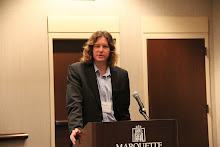Halloween is my favorite holiday. In honor of it, here is an appropriately themed meditation on death from Michel Foucault's The Birth of the Clinic:
"To know life is given only to that derisory, reductive, and already infernal knowledge that only wishes it dead. The Gaze that envelops, caresses, details, atomizes the most individual flesh and enumerates its secret bites is that fixed, attentive, rather dilated gaze which, from the height of death, has already condemned life.
But the perception of death in life does not have the same function in the nineteenth century as at the Renaissance. Then it carried with it reductive significations: differences of fate, fortune, conditions were effaced by its universal gesture; it drew each irrevocably to all; the dances of skeletons depicted, on the underside of life, a sort of egalitarian saturnalia; death unfailingly compensated for fortune. Now, on the contrary, it is constitutive of singularity; it is in that perception of death that the individual finds himself, escaping from a monotonous, average life; in the slow, half-subterranean, but already visible approach of death, the dull, common life becomes an individuality at last; a black border isolates it and gives it the style of its own truth. Hence the importance of the Morbid. The macabre implied a homogeneous perception of death, once its threshold had been crossed. The morbid authorizes a subtle perception of the way in which life finds in death its most differentiated figure. The morbid is the rarefied form of life, exhausted, working itself into the void of death; but also in another sense, that in death it takes on its peculiar volume, irreducible to conformities and customs, to received necessities; a singular volume defined by its absolute rarity."
Subscribe to:
Post Comments (Atom)


No comments:
Post a Comment